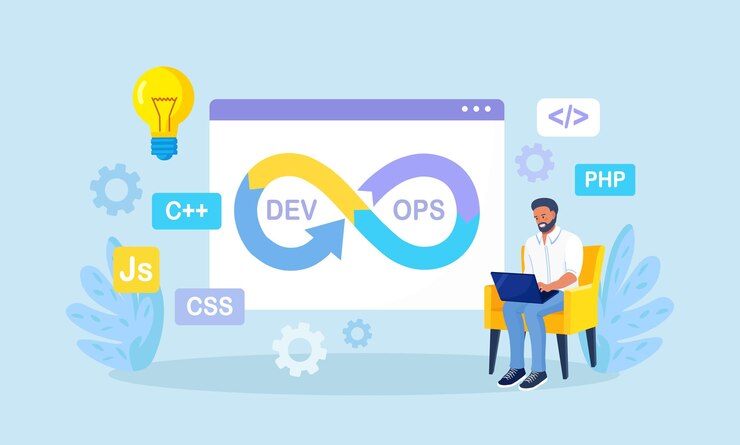
About Course
DevOps Engineering
Course Snippet
Master the art of DevOps and transform the way you develop, deploy, and manage applications! Our DevOps Engineering course will equip you with the skills to streamline software development, automate processes, and manage infrastructure efficiently. Whether you’re new to DevOps or looking to deepen your expertise, this course provides hands-on experience with tools like Docker, Kubernetes, Jenkins, and AWS. Enroll now to revolutionize your approach to development and operations!
Course Overview
Enter the world of DevOps Engineering and learn how to bridge the gap between development and operations. This course is designed for software engineers, system administrators, and IT professionals looking to adopt DevOps practices to increase efficiency, speed, and collaboration in software delivery. You’ll master key tools, automation techniques, and practices that enable continuous integration, continuous delivery (CI/CD), and infrastructure management. By the end of the course, you’ll be prepared to implement DevOps solutions in real-world environments.
Course Outline
Our curriculum provides a solid foundation in the principles of DevOps and hands-on experience with industry-standard tools. You’ll explore:
- Introduction to DevOps: Understand the core principles of DevOps, the benefits of adopting DevOps practices, and the cultural shift required for success.
- Version Control with Git: Learn how to manage source code using Git and collaborate on development projects with GitHub.
- Continuous Integration and Continuous Delivery (CI/CD): Master the CI/CD pipeline, learning how to automate software testing and deployment using tools like Jenkins, Travis CI, and CircleCI.
- Containerization with Docker: Get hands-on experience with Docker, learning how to containerize applications for efficient deployment and scaling.
- Orchestration with Kubernetes: Dive into Kubernetes and learn how to orchestrate, manage, and scale containerized applications across multiple servers.
- Infrastructure as Code (IaC): Automate infrastructure provisioning and management using IaC tools like Terraform and Ansible.
- Monitoring and Logging: Explore tools like Prometheus, Grafana, and ELK Stack (Elasticsearch, Logstash, and Kibana) to monitor application performance and troubleshoot issues.
- Cloud Platforms (AWS, Azure, GCP): Gain hands-on experience with cloud infrastructure, including managing resources and deploying applications in the cloud using platforms like AWS, Microsoft Azure, and Google Cloud Platform.
- Security in DevOps: Learn how to incorporate security best practices into the DevOps lifecycle to create secure and compliant applications.
- DevOps Best Practices: Explore real-world case studies and learn the best practices for successful DevOps implementation.
- Real-World Projects: Apply your knowledge by working on real-world projects that involve building and automating CI/CD pipelines, managing cloud infrastructure, and deploying scalable applications.
Learning Objectives
By the end of this course, you’ll be able to:
- Understand the key principles and practices of DevOps and implement them in software development processes.
- Set up CI/CD pipelines to automate testing and deployment, reducing time-to-market.
- Containerize applications using Docker and orchestrate them with Kubernetes for efficient scaling.
- Use Infrastructure as Code (IaC) tools like Terraform and Ansible to automate infrastructure management.
- Deploy and manage applications on cloud platforms such as AWS, Azure, and Google Cloud.
- Monitor, log, and troubleshoot application performance issues using tools like Prometheus and ELK Stack.
- Integrate security into the DevOps workflow to ensure robust and secure applications.
- Work on real-world DevOps projects that demonstrate your ability to streamline software delivery.
Duration
This course is designed to fit into your schedule, providing flexibility while maintaining depth. In 6 months, with 6-8 hours of study per week, you’ll gain the skills needed to become a proficient DevOps Engineer.
Prerequisite
This course is ideal for individuals with a background in software development, system administration, or IT operations. Familiarity with Linux command-line tools, basic scripting, and some experience with cloud platforms is recommended but not required.
Course Format
The course includes a combination of:
- Live sessions,
- Recorded lectures,
- Hands-on labs and projects.
You’ll also have access to a collaborative learning community and expert instructors who provide guidance and support throughout the course.
Assessment and Certificate
Upon completing the course, you’ll receive a Certificate of Achievement in DevOps Engineering. This certification will validate your expertise and can be added to your LinkedIn profile or resume to enhance your career opportunities.

